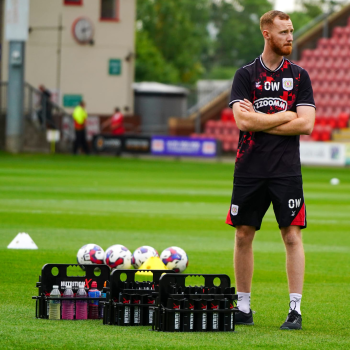At Nutrition X, we believe firmly in a food-first approach when it comes to adequately supporting athlete performance and recovery at every stage, from youth sport right through to those at the very top of their game.
We’re very proud to work with numerous professional clubs that place an important emphasis on long-term athlete development, starting with their academy players. As the saying goes, from small acorns mighty oaks grow, and this is certainly the case when it comes to academy sport. But how important, exactly, is nutrition at this younger stage of an athlete’s career?
To explore this, we’ve delved into football’s EPPP (Elite Player Performance Plan), in place at numerous top-level clubs across the UK, and explored the role that nutrition plays in each stage.
What is Elite Player Performance Plan (EPPP)?
“The Elite Player Performance Plan (EPPP) is a long-term strategy with the aim of developing more and better homegrown players. The EPPP is the result of consultation between the Premier League and its clubs, representatives of the Football League, the Football Association and other key football stakeholders. Introduced in 2012 with the mission of producing more and better homegrown players, the plan promotes the empowerment of each individual player through a player-led approach.”
Premier League Elite Player Performance Plan - EPPP
What do players first learn at academy level?
A youth athlete will often progress through the academy system, starting in the foundation phase (U9s - U11s) before progressing onto the youth development phase (U12s – U16s) and professional development phase (U17s – U23s). Each phase looks to build upon one another to allow a smooth transition into the professional game.
Nutrition is a small component of academy football and therefore the EPPP. However, it is crucial that young athletes gain an understanding of the importance of correct nutrition to support their development and progression through the academy phases to allow a smooth transition into becoming a professional athlete.
What is the Foundation Phase in Academy Football?
The foundation phase (FP) does exactly what it says on the tin; creates a foundation. In this phase players will learn about the importance of good nutrition for health, growth, and physical development with the expectation that this will stay with them throughout their career. There is a focus around a balanced diet; exploring the different macro and micronutrients and why these are important. A main nutritional consideration for the FP players is the extra activity they do away from football training e.g., a full day of school which may include extra physical activity such as PE (physical education) and recreational sports.
What is the Youth Development Phase in Academy Football?
The youth development phase (YDP) looks to build upon the players knowledge with a higher emphasis on how to fuel like a footballer. A larger influence from research and scientific data is implemented to help players understand the physical demands of the game and how to fuel for this. In a typical week a player could train between 329 – 427 minutes (roughly 5.5 – 7 hours) and cover between 20 – 26km in the YDP. It’s also important to consider that training duration can increase as much as 200 minutes per week as players transition from U9 (FP) to U14’s (YDP). It is therefore essential that adequate energy is provided to meet the significant growth and physical development that takes place during this phase. A large emphasis is placed upon a ‘food first’ philosophy to encourage players to consume whole food sources to maximise energy availability.
What is the Professional Development Phase in Academy Football?
The professional development phase (PDP) is where players start to perfect their craft in the pursuit of a spot in the first team. The structure and strategies implemented in the PDP are not too dissimilar to the first team, with a higher focus on fuelling for performance. Although maximising energy availability is still important, a larger focus is on how and when this energy is used. The PDP players naturally start developing a higher endogenous glycogen storage capacity which means that there is a lower dependence on exogenous carbohydrates. Strategies such as carbohydrate periodisation will start to be implemented to ensure that the player is appropriately fuelled for every session to match the desired adaptation without compromising body composition. The more intricate details that are implemented in the PDP allow players to adapt and transition into the professional environment of the first team.
The EPPP in Practice: West Bromwich Albion FC Academy
Our Nutritionist Owen currently supports West Bromwich Albion FC Academy. Working closely with the Head of Academy Sports Science (Tom Page), Owen provides education across all phases of the academy which has been a huge success, no doubt playing a part in West Bromwich Albion winning the Premier League Cup in the 2021-22 season.
Tom Page (Head of Academy Sports Science) shared his thoughts on the importance of nutrition across the phases:
“It is important in the foundation phase to engage the players, but most importantly parents/carers with the concept of good nutrition and food as fuel. We look to educate players and parents around a balanced diet, what are good and bad food choices and the importance of hydration for energy levels.
The Youth Development Phase is a key phase for introducing some key concepts to players around fuelling specifically for football and physical development. More bespoke and individual nutrition solutions are introduced during this phase, including food diaries, player-parent consultations and individualised food/meal plans.
The Professional Development Phase will see some players transition into professional football. It is at this stage where players use the knowledge that has been developed in the YDP to take some ownership of their nutrition choices. Nutrition support in this phase becomes more bespoke and individualised, with all players accessing professional nutrition support through 1-to-1 consultations with a performance nutritionist. Additionally, more specific goals are set in relation to body composition and anthropometric testing (i.e., body mass and body fats) become more prominent and regular. There is an expectation during this phase that players are maintaining body fat within a target range of 6-10% and steadily increasing their lean muscle mass throughout the course of their time within the phase and onwards into the professional game”.







